Disclosure: Meeple Mountain received a free copy of this product in exchange for an honest, unbiased review. This review is not intended to be an endorsement.
I can’t explain the science behind this, but two player games do not perform well in my collection.
Last year I wrote a long detailed review on an overlooked fantasy skirmish called Stonebound Saga. While it pretends it can handle more than two players, its structure concentrates on the head-to-head experience. It is a well-crafted game with dozens of characters and hundreds of abilities, meaning that you need a dedicated gaming partner willing to learn the ins and outs of this vast system with you. Sadly, I never found that individual and had to divorce the game from my collection.
Air, Land, and Sea is the complete opposite of Stonebound Saga. Instead of hundreds of cards, you only have 18. The game doesn’t last over an hour; it’s about 20 minutes. Is that enough to keep it in my collection?
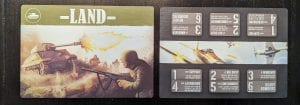
Storming The Cliche
One easy way to convince me is lightweight rules and this is one of the easiest games out there. It is a race to collect 12 victory points that you will gain through a series of battles. Each battle consists of three theatres of war: Air, Land, and Sea. Get it?
Since this is a World War Two game, you will try to win your theatres using troops, planes, and tanks. Each card has a number from 1 to 6. Except for the 6 cards, everything has text abilities that either trigger when played or last throughout a battle. In addition, all of the cards belong to one of the three theaters. For the battle to end in victory, you must have a higher number than your opponent in at least two out of the three theatres when the round is over. On your turn, you play one of your cards in your hand, placing it in the appropriate theater, and then your turn is over.
However, you do have an alternative option. You can play the card face down instead of face up, giving it 2 Strength. When played this way, the card does not need to match the theater. The game calls this improvisation, and while I do admire the mechanism, I have to confess that it brings up silly images in my head like beached submarines and drowned planes. If only they had horses with anti-tanks. That would have been interesting.
There is a third option, and it is probably one of the most exciting rules I have seen in years. Instead of playing a card, you can retreat. You forfeit the battle, and your opponent earns victory points. The catch is that the more cards you play, the more victory points your opponent gets.
Once the battle is over you’ll see if anyone has won the war by reaching 12 points. If not then you’ll draw up your battle lines once more.
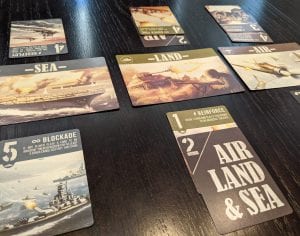
The Greatest Victory Requires No Battle
The usual routine behind these sorts of games involves trying to win as much as possible by cleverly playing your fancy numbers in cute ways. Not here. The decision to bow out of a losing fight is a critical skill to master. It forces you and your opponent to surf a wave of doubt, and that wave is getting bigger as you approach the shoreline. It’s brilliant stuff.
This system presents us with a whole new realm of decisions to explore. After every played card, you will always put on your War General cap, take out your binoculars, survey the scene, and ask yourself if it’s worth continuing. It’s funny how your opponent probably thinks the same thing, leading to a situation where both sides want to give up.
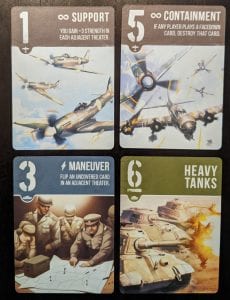
Military Intelligence Is A Contradiction
That might sound silly, but it works because of the deck setup. As I’ve mentioned before, the game has 18 cards. Your hand for each battle is 6 cards, meaning for every card you don’t have, there is a 50% chance your opponent will have it. Due to the understandable circumstances, it gives you enough information to get an idea of what is happening, but not enough to grant you confidence.
This would be the part where I outline my conclusions and let you know if I recommend the game, but I feel it is redundant at this point. You have already read a few hundred words of me praising endlessly, and I don’t have much more to say. It’s a masterfully designed game that has no notable holes in its systems or mechanisms.
The only way I would ever deny a game of Air, Land, and Sea is if it involves a hostage situation or blackmail. Otherwise, this is a brilliant lightweight two-player game, and it just demonstrates how much you can do with so little. I will keep this one in my collection.
You can purchase a copy of Air, Land, and Sea on Amazon US


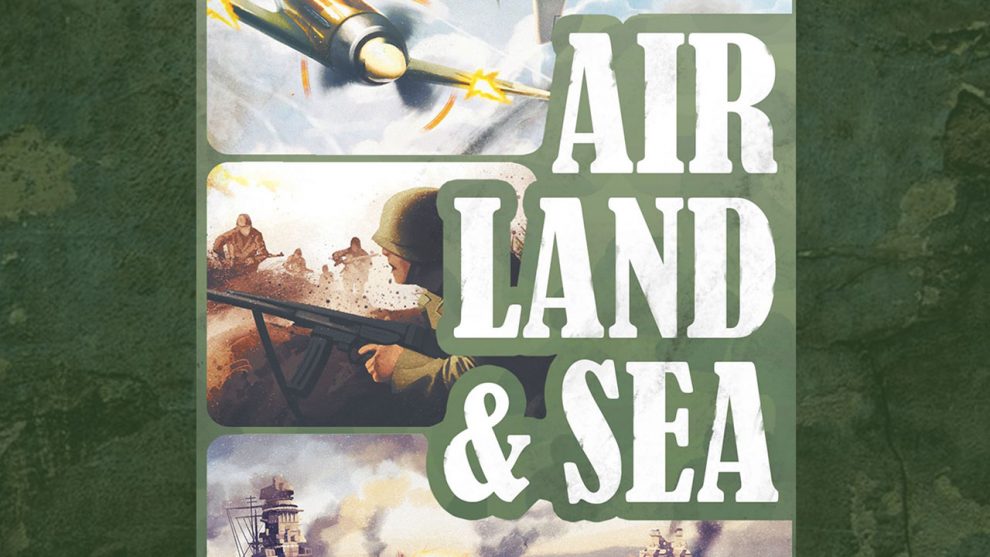




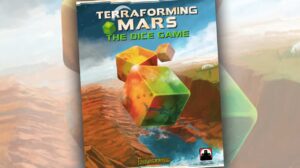




Add Comment